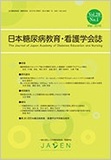Japanese
English
- 販売していません
- Abstract 文献概要
- 参考文献 Reference
- サイト内被引用 Cited by
【目的】就労している2型糖尿病患者に実施した,生活時間のマネジメントに関する個別面接の効果を検証する.
【方法】層別無作為化比較試験であり,生活時間のマネジメントの“仕事の調整”“時間のコントロール”“価値観に合った目標設定と行動”“生活リズムの調整”の4側面から個別面接を実施した.なお介入効果は,HbA1c,BMI,生活時間のマネジメント,セルフケア能力,睡眠,ストレスを確認した.
【結果】介入群14名,対照群15名を分析し,HbA1c,生活時間のマネジメント,セルフケア能力が,ベースラインと介入後の差で,介入群が有意に改善していたが,BMI,睡眠,ストレスは,差はなかった.
【結論】セルフケア能力や,HbA1cの改善がみられたことから,就労している2型糖尿病患者にとって生活時間のマネジメントの視点からの介入は有効であると考えられ,臨床での活用を目指し実行可能性を高めるための検討が今後必要である.
[Purpose] This study aimed to elucidate the effects of nursing interventions on time management in the daily life of employed people with diabetes.
[Method] In this stratified randomized comparative trial, individual interviews were conducted on the following four aspects: “adjustment of work,” “time control,” “goal setting and behaviors consistent with personal values,” and “adjustment of life rhythms.” The intervention was evaluated by assessing HbA1c level, Body Mass Index (BMI), time management in daily life, self-care agency, sleep condition, and stress level.
[Effect] The intervention and control groups comprised 14 and 15 participants, respectively. According to the differences between baseline and post-intervention status, although significant improvements were observed in HbA1c level, time management in daily life and self-care agency in the intervention group, no such difference was found with reference to BMI, sleep condition, and stress level.
[Conclusion] Since improvements were observed in self-care agency and HbA1c level, this intervention on time management in the daily life of employed patients with type 2 diabetes was considered to be effective. Future studies need to focus on improving its viability for practical use in the field.
Copyright © 2020, Japan Academy of Diabetes Education and Nursing. All rights reserved.


